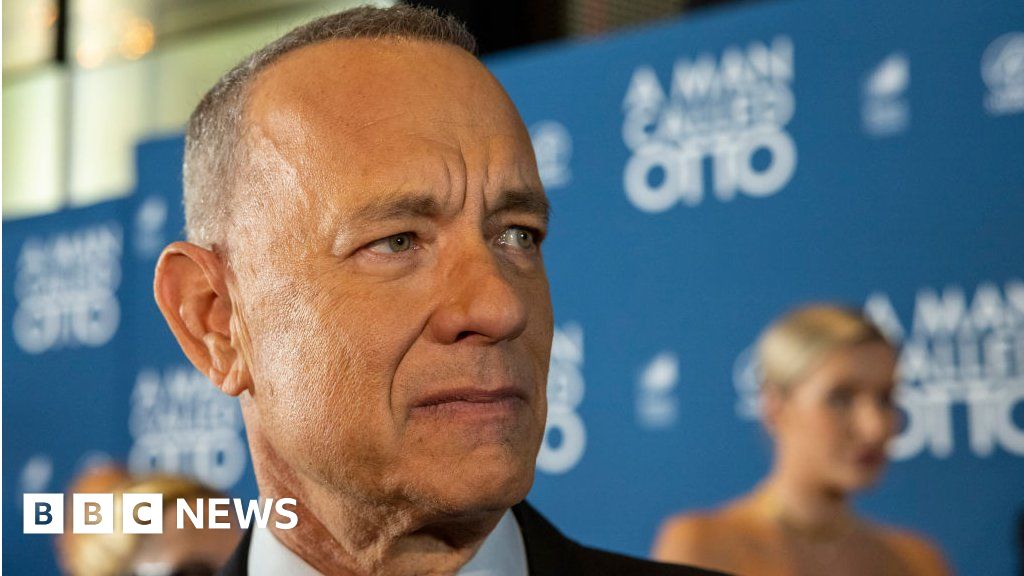Tom Hanks: SNL, MAGA Outrage & Conspiracy Theories
Did a single performance on "Saturday Night Live" truly ignite a firestorm of controversy, leaving a Hollywood icon in the crosshairs of social media outrage? The answer, unequivocally, is yes, as Tom Hanks' recent appearance on the show's 50th-anniversary special has sparked a heated debate, highlighting the ever-shifting landscape of political correctness and the power of perception in the digital age.
On February 15th, "Saturday Night Live" celebrated its golden anniversary, a milestone marked by nostalgia, celebrity appearances, and, of course, the potential for controversy. Tom Hanks, a long-time friend of the show, was a prominent presence, opening the segment with a heartfelt tribute in memoriam. However, it was his subsequent portrayal of a character, a "MAGA" voter in a callback to the popular "Black Jeopardy!" sketch, that quickly became the focal point of heated discussions across social media platforms.
The performance, which saw Hanks reprising his role as "Doug," a character originally featured in a 2016 episode, was met with mixed reactions. While some viewers found it humorous, others, primarily supporters of former President Donald Trump, accused Hanks of being tone-deaf and perpetuating negative stereotypes. This backlash underscores the highly charged political climate and the sensitivity surrounding portrayals of political ideologies in the entertainment industry.
But the controversy didn't end there. The internet, as it often does, began to uncover layers of speculation and misinformation. Some users began linking Hanks to various conspiracy theories, digging into his Instagram archives and scrutinizing seemingly innocuous posts for hidden meanings. One such instance involved a picture Hanks shared on July 18, 2016, of a glove he found in Red Bluff, California. The caption accompanying the photo was quickly scrutinized, with some attempting to connect it to various unfounded claims.
Adding fuel to the fire, a QAnon conspiracy theory, which has gained traction on social media, falsely claimed that Hanks became a citizen of Greece because the country allegedly classifies pedophilia as a disability. This, combined with a fabricated BBC News story claiming Hanks's arrest on child pornography charges, demonstrates the ease with which false information can spread online, often fueled by pre-existing biases and political divisions.
The incident also brought renewed attention to Hanks's 1988 film "Big." Despite being a beloved classic, some questioned the appropriateness of the romantic storyline in the film, reigniting a debate about its content and its potential impact on viewers.
| Category | Information |
|---|---|
| Full Name | Thomas Jeffrey Hanks |
| Date of Birth | July 9, 1956 |
| Place of Birth | Concord, California, USA |
| Spouse(s) | Samantha Lewes (m. 1978; div. 1987), Rita Wilson (m. 1988) |
| Children | Colin Hanks, Elizabeth Hanks, Chester Hanks, Truman Hanks |
| Education | Chabot College, California State University, Sacramento |
| Notable Awards |
|
| Career Highlights |
|
| Known For | His versatility, everyman appeal, and ability to portray both comedic and dramatic roles with equal skill. Often associated with playing "good guy" characters. |
| Professional Affiliations |
|
| Website | IMDb (Reference) |
The reaction to Hanks's "SNL" appearance highlights the ongoing culture wars and the role of celebrity in shaping public opinion. His portrayal of a Trump supporter, intended as satire, was interpreted by some as an attack, demonstrating how even the most seasoned actors can find themselves at the center of a political maelstrom. The fact that the performance took place on the 50th anniversary of "SNL," a show known for pushing boundaries, underscores the evolving nature of comedy and the need for artists to navigate the complexities of the current social and political climate.
The backlash against Hanks's performance also serves as a cautionary tale about the power of misinformation. The spread of false claims, such as the fabricated BBC story and the QAnon conspiracy theory, highlights the importance of media literacy and critical thinking in an age of easily accessible online content. The swiftness with which such claims can circulate and the difficulty of debunking them underscore the need for vigilance against the spread of disinformation.
The controversy also raises questions about the nature of artistic expression and the boundaries of comedy. Some critics have accused Hanks of being tone-deaf, suggesting that his portrayal of a Trump supporter was insensitive to those who identify with the political ideology. Conversely, Hanks' supporters may argue that satire is a legitimate form of artistic expression and that those who take offense are missing the point.
One particularly troubling aspect of the controversy is the apparent linking of Hanks to harmful and baseless accusations. These false claims, which include the QAnon conspiracy theory and the fabricated BBC report, represent a dangerous trend of weaponizing social media to spread lies and damage the reputations of public figures. These attacks are often motivated by political agendas, and they can have a devastating impact on the targeted individuals.
The rapid spread of misinformation is a significant challenge of the digital age, and the Tom Hanks controversy provides a clear illustration of this. The speed at which false stories can be disseminated, and the difficulty in correcting them, demonstrates the importance of media literacy, critical thinking, and the need for fact-checking. Individuals must become more discerning consumers of information and recognize the sources of bias and potential deception.
The debate surrounding Hanks also touches on the ever-evolving role of celebrities in society. Once a subject of admiration, celebrities now regularly find themselves scrutinized for their political views, often facing both praise and condemnation. This ongoing trend reflects a change in how the public perceives entertainers, and how celebrities use their platform to express political and social views.
While the controversy surrounding Tom Hanks's "SNL" appearance may have been fueled by political divisions and the spread of misinformation, it also serves as a reminder of the enduring power of art and entertainment. The performance, even if unintentionally, triggered a wide-ranging dialogue on stereotypes, the role of satire, and the impact of the digital age on communication. The incident highlights the need for artists and audiences alike to approach artistic expressions with critical minds, recognizing that interpretation is often subjective and that the pursuit of understanding is an ongoing process.
The episode further emphasizes the need for responsible use of social media. The amplification of false claims and the harassment faced by Hanks show the potential of social media to amplify both good and bad. The focus on media literacy and responsible digital behavior has never been more important, as citizens must be prepared to critically evaluate the massive volume of content being constantly produced and shared online.
In conclusion, the Tom Hanks "SNL" controversy is a microcosm of the broader challenges facing society today. It illustrates the need to approach digital content with a critical eye, to guard against the spread of misinformation, and to recognize the complex interplay of politics, culture, and celebrity in the modern world. The situation emphasizes the importance of fact-checking, media literacy, and civil discourse. It also emphasizes the ongoing struggle to reconcile artistic expression with evolving cultural sensitivities in an era defined by the relentless flow of information and the rise of digital echo chambers.


